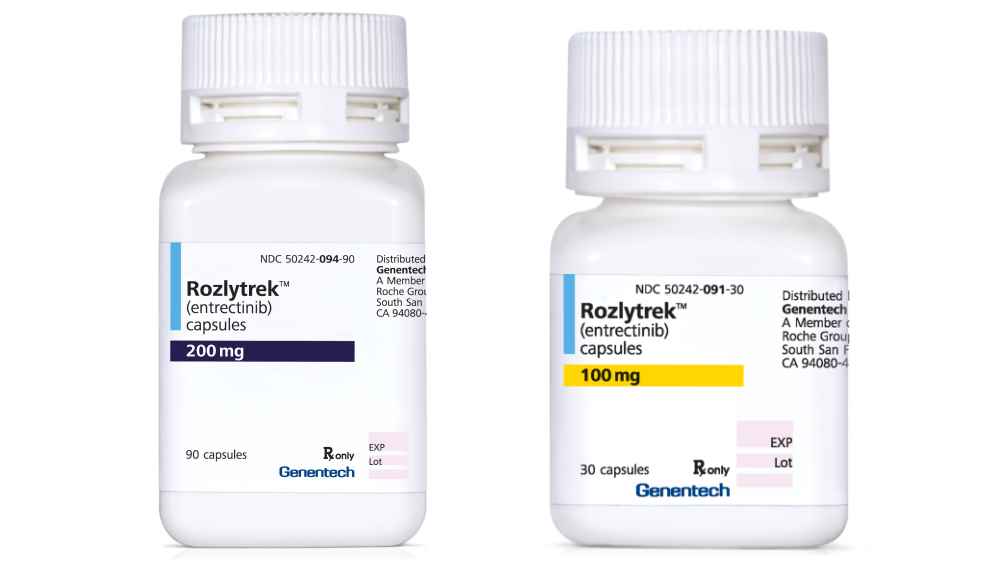The Food and Drug Administration (FDA) has granted accelerated approval to Rozlytrek (entrectinib; Genentech) for the treatment of:
- Adult patients with metastatic non-small cell lung cancer (NSCLC) whose tumors are ROS1-positive
- Adult and pediatric patients aged ≥12 years with solid tumors that have a neurotrophic tyrosine receptor kinase (NTRK) gene fusion without a known acquired resistance mutation, are metastatic or where surgical resection is likely to result in severe morbidity, and have progressed following treatment or have no satisfactory alternative therapy
Rozlytrek is an inhibitor of tropomyosin receptor tyrosine kinases (TRK), proto-oncogene tyrosine-protein kinase ROS1 (ROS1), and anaplastic lymphoma kinase (ALK). Fusion proteins that include TRK, ROS1, or ALK kinase domains can drive tumorigenic potential through hyperactivation of downstream signaling pathways leading to unconstrained cell proliferation. Rozlytrek has demonstrated in vitro and in vivo inhibition of cancer cell lines derived from multiple tumor types harboring NTRK, ROS1, and ALK fusion genes.
The approval was based on data from integrated analysis of the phase 2 STARTRK-2, Phase 1 STARTRK-1 and Phase 1 ALKA-372-001 trials, and data from the Phase 1/2 STARTRK-NG study. The studies included patients with several solid tumor types, including breast, cholangiocarcinoma, colorectal, gynecological, neuroendocrine, non-small cell lung, salivary gland, pancreatic, sarcoma and thyroid cancers.
Results showed Rozlytrek reduced tumor size in 78% of patients with ROS1-positive, metastatic NSCLC (overall response rate [ORR]; N=51), with 5.9% of patients having a complete response; duration of response (DoR) ranged from 1.8 to 36.8+ months (n=40 out of 51). Tumor shrinkage persisted for at least 12 months in 55% of the 40 patients.
Additionally, a reduction in tumor size was observed in Rozlytrek-treated patients with NTRK gene fusion-positive, locally advanced or metastatic solid tumors (ORR: 57%; N=54), with 7.4% having a complete response; objective responses were observed across 10 tumor types (DoR ranged from 2.8 to 26.0+ months; n=31 out of 54). Patients with CNS metastases at baseline also demonstrated objective responses. Tumor shrinkage persisted for at least 9 months in 61% of the 31 patients.
Regarding safety, the most common adverse reactions (≥20%) were fatigue, constipation, dysgeusia, edema, dizziness, diarrhea, nausea, dysesthesia, dyspnea, myalgia, cognitive impairment, increased weight, cough, vomiting, pyrexia, arthralgia, and vision disorders.
“Today’s approval includes an indication for pediatric patients, 12 years of age and older, who have NTRK-fusion-positive tumors by relying on efficacy information obtained primarily in adults,” said Richard Pazdur, MD, director of the FDA’s Oncology Center of Excellence and acting director of the Office of Hematology and Oncology Products in the FDA’s Center for Drug Evaluation and Research. “Efficacy in adolescents was derived from adult data and safety was demonstrated in 30 pediatric patients.”
Continued approval of Rozlytrek may be contingent upon verification and description of clinical benefit in a confirmatory trial.
PatiBiomarker testing for ROS1 in NSCLC and NTRK gene fusions across all solid tumors is the only way to identify people who are eligible for treatment with Rozlytrek.
Rozlytrek is supplied as 100mg and 200mg capsules. Patients should be selected for treatment based on the presence of ROS1 rearrangement(s) in tumor specimens or NTRK gene fusion. Currently, an FDA-approved companion diagnostic for Rozlytrek is not available, but is in the works.
For more information visit gene.com.
This article originally appeared on MPR
